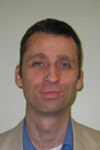Peter works as a Senior Lecturer in the Centre for Academic Success. He provides teaching, training, online resources and tutorial support in mathematics, statistics (including SPSS), ICT (including Excel and NVivo), dissertation support, quantitative research methods, qualitative research and writing for publication. Peter also provides tutorials in technical subjects to students with specific learning differences (such as dyslexia and dyscalculia).
Peter has a research and development background in secondary and tertiary mathematics education. He is a member of the Centre for the Study of Practice and Culture in Education. He also maintains an active research profile on ResearchGate.
Since 2011 Peter has led a teaching enhancement project between the University and a grammar school in Rugby under their Teaching School status involving the use of robotics in mathematics and science education for Years 10 to 13.
Peter was the lead developer on a HE STEM Programme project between 2012 and 2013 to establish a Statistical Advisory Service at the University. Following on from this Project, in 2014 he was involved in the donation of a large number of statistics educational resources to the statstutor repository.
In 2017 Peter was awarded an Erasmus+ Mobility Partnership with the University of Rwanda. He is working with two of their Centres of Excellence in academic writing and applied statistics teaching and support of their research students.
MA in Mathematics from Cambridge University
PhD in Mathematics from the University of Reading
PG Cert in Mathematics Support and Dyslexia and Dyscalculia in Further and Higher Education from Loughborough University
Peter's main research interests are: mathematics education research at the secondary and tertiary levels, serious gaming in mathematics, mathematical educational robotics, learning development research (including mathematics support, academic writing, dissertation support and disciplinarity), multi-media discrete mathematics education, advanced mathematical behaviour research.
Samuels, P. C. and Poppa, S. (2017) Developing extended real and virtual robotics enhancement classes with years 10-13. In: M. Merdan, W. Lepuschitz, G. Koppensteiner and R. Balogh, eds. Robotics in Education: Research and practices for robotics in STEM education. Advances in Intelligent Systems and Computing, 457. Berlin: Springer-Verlag, pp. 69-81.
Haapasalo, L. and Samuels, P. C. (2016) Reappraising learning technologies from the viewpoint of the learning of mathematics. Teaching Mathematics and Computer Science, 14(2), pp. 221-246.
Samuels, P. C. (2014) Techniques for Capturing Critical Thinking in the Creation and Composition of Advanced Mathematical Knowledge. Double Helix, 2: Critical thinking and writing in the STEM disciplines.
Samuels, P. C. (2013) Promoting Learning Development as an Academic Discipline. Journal of Learning Development in Higher Education, 5.
Samuels, P. C. (2012) Capturing and communicating advanced mathematical behaviour. Journal of Learning Development in Higher Education, Special Edition: Developing Writing in STEM Disciplines.
Goodband, J., Solomon, Y., Samuels, P. C., Lawson, D. A. and Bhakta, R. (2012) Limits and potentials of social networking in academia: Case study of the evolution of a mathematics Facebook community. Learning Media and Technology, 37(3), pp. 236-252.
Samuels, P. C., Deane, M. and Griffin, J. (2012) Report on postgraduate training event in science education writing. Journal of Learning Development in Higher Education, 4.
Samuels, P. C. and Haapasalo, L. (2012) Real and virtual robotics in mathematics education at the school-university transition. International Journal of Mathematical Education in Science and Technology, 43(3), pp. 285-301.
Samuels, P. C. (2011) Individual differences and needs in mathematics support. In: A. C. Croft and M. Grove, eds. Tutoring in a Mathematics Support Centre: A guide for postgraduate students. Birmingham: National HE STEM Programme, pp. 14-18.
Rae, A. and Samuels, P. C. (2011) Web-based Personalised System of Instruction: An effective approach for diverse cohorts with virtual learning environments? Computers & Education, 57(4), pp. 2423-2431.
Haapasalo, L. and Samuels, P. C. (2011) Responding to the Challenges of Instrumental Orchestration through Physical and Virtual Robotics. Computers & Education, 57(2), pp. 1484-1492.
Samuels, P. C. and Deane, M. (2011) Writing for Mathematics Education at Doctorate Level. In M. Deane and P. O’Neill, eds. Writing in the Disciplines, Basingstoke: Palgrave Macmillan, pp. 140-154.
Samuels, P. C. (2010) Motivating mathematics learning through an integrated technology enhanced learning environment. International Journal of Technology in Mathematics Education, 17(4), pp. 197-203.
Samuels, P. C. and Patel, C. (2010) Scholarship in Mathematics Support Services. Journal of Learning Development in Higher Education, 2.
Appleby, J. C., Samuels, P. C. and Treasure-Jones, T. (1997) Diagnosys – a knowledge-based diagnostic test of basic mathematical skills. Computers & Education, 28(2), pp. 113–131.
Samuels, P. C. (1991) Hypertext for computational mathematics, in J. H. Johnson, S. McKee and A. D. Vella, eds. Artificial Intelligence in Mathematics, The Institute of Mathematics and its Applications Conference Series, Oxford: Clarendon Press, pp. 252-262).
